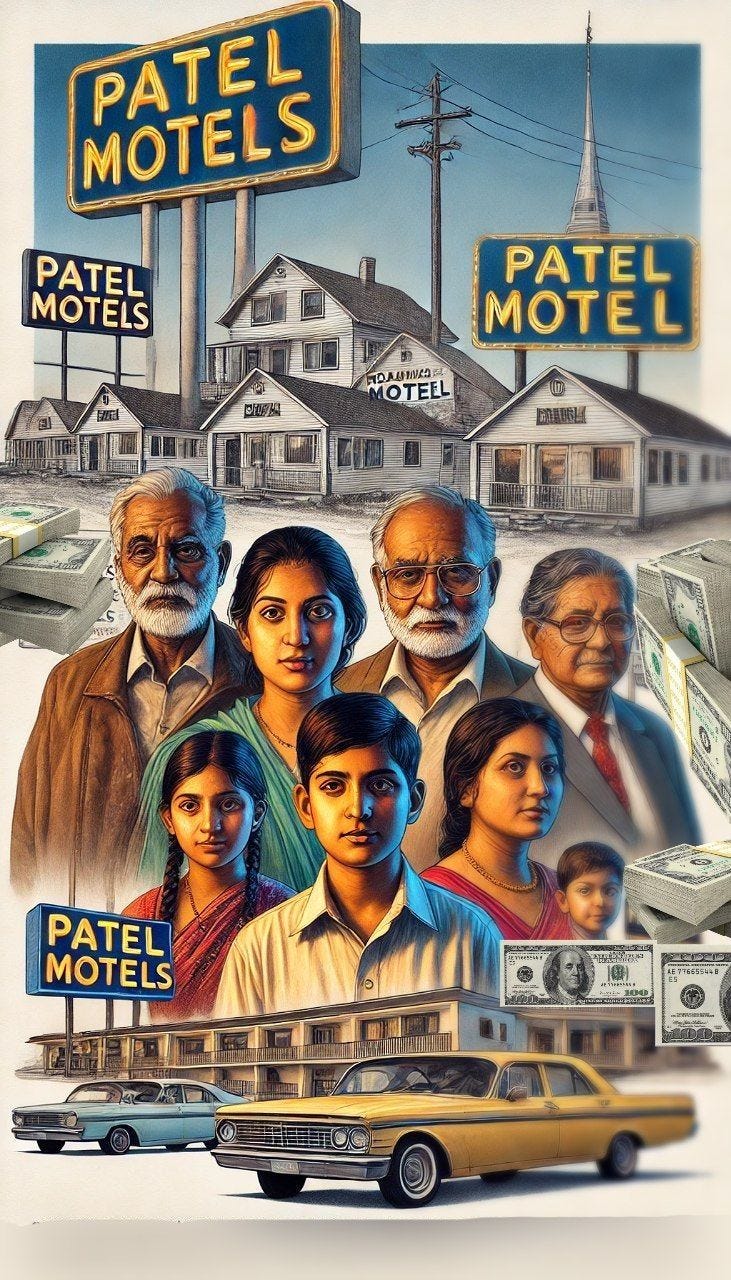Motel Empire: How Patel Families Transformed the American Roadside
The story of Patel Motels is a tale of migration, community, and entrepreneurial success that reshaped the hospitality industry in America. It begins with the journey of Indian immigrants, specifically those from the Patel community, and their incredible rise to dominance in the U.S. motel business.
The Beginnings: From Gujarat to Africa and Beyond
The Patels hail from the state of Gujarat in western India, known for its rich culture of trade and business. Many members of this community migrated to East Africa in the late 19th and early 20th centuries, seeking better economic opportunities in British colonies like Kenya, Tanzania, and Uganda. There, they worked as traders and small businessmen, learning the intricacies of managing commerce.
However, the winds of change in the 1960s, especially the rise of nationalist movements and policies targeting foreign communities, led to instability for Indians in Africa. The Patels, among other Indian families, began to look elsewhere, with many setting their sights on the United States.
The First Wave: Arrival in America
The major wave of Indian immigration, including the Patels, began after the Immigration and Nationality Act of 1965 was passed, allowing skilled workers and professionals from India to enter the U.S. This was a turning point for many in the Patel community, who had accumulated savings, business acumen, and a strong desire to succeed.
Upon arriving in the U.S., many Patels faced the challenges of adapting to a new country and culture, and finding a foothold in the American economy. They often started with odd jobs, but a unique opportunity presented itself in the form of motels.
The Motel Opportunity: 1970s and the Struggling Economy
By the 1970s, many independent motels across America were suffering due to the rise of big hotel chains like Hilton and Holiday Inn, and shifts in the travel industry. These motels, often located along highways, were struggling to stay afloat and were being sold at bargain prices. The Patels, with their communal approach and strong work ethic, saw this as an opportunity.
Unlike typical buyers, the Patels had a family-based, cost-effective model. They would buy these motels, often live on-site to reduce overheads, and work as a family unit to manage all aspects of the business. This allowed them to maintain profitability with minimal staff and resources.
One of the first success stories was that of Thakorbhai Patel, who purchased his first motel in San Francisco in 1942. However, the motel boom for the Patels really began in the 1970s. Community networks and word-of-mouth helped more Patels join the motel business, creating a ripple effect.
The Patel Motel Boom: Expansion and Networking
As more Patels entered the motel business, they began helping each other, creating informal networks to support new arrivals with financing, advice, and mentorship. These networks were crucial for securing loans and navigating the American business landscape.
The motels they acquired, which were often in poor condition or on the verge of bankruptcy, were slowly revitalized under Patel management. The family model of operation ensured low operational costs, and their emphasis on cleanliness, safety, and affordability helped attract travelers and business customers alike.
By the 1980s, the Patel Motels became a recognizable phenomenon. The term “Patel Motel” began to appear as a descriptor for the widespread ownership of motels by the Patel community. This was not just a coincidence or stereotype; it was a reflection of the fact that by this time, the majority of motels in the U.S. were owned by Patels. Estimates suggest that by the 1990s, Patels owned about 50% of the budget motel industry in the U.S.
Building Generational Wealth and Legacy
The success of Patel motels wasn’t just about owning businesses; it was about building generational wealth. As families grew, children often helped in the family business, learning the ropes from a young age. Many of these children would go on to earn degrees in business or other fields, bringing even more expertise into the family operations.
By pooling resources and investing wisely, the Patel community began to expand beyond budget motels, acquiring larger properties, hotels, and even entering related industries such as real estate and hospitality management. Over time, the second and third generations diversified into different sectors, while still maintaining strong ties to the motel industry.
The Rise of AAHOA: Advocating for Indian Hoteliers
In 1989, the Asian American Hotel Owners Association (AAHOA) was formed, primarily driven by Indian-American motel owners, many of them Patels. AAHOA became a significant force in the hospitality industry, advocating for the rights and interests of Indian-American hoteliers. The association helped address issues such as discrimination faced by Indian motel owners, who often encountered prejudice from customers and suppliers.
Through AAHOA, Indian-Americans in the motel industry gained a powerful voice, helping to influence regulations and policies that affected their businesses. The organization also provided a platform for networking and education, further professionalizing and expanding the reach of Patel motel owners.
Challenges and Adaptations
While the success of Patel motels is impressive, it wasn’t without its challenges. In the 1990s and 2000s, the rise of online travel agencies, changes in consumer preferences, and the increasing dominance of branded hotel chains posed new challenges for independent motel owners.
Many Patels adapted by aligning with franchised chains like Super 8, Days Inn, and Motel 6. This allowed them to benefit from brand recognition and standardized services while still maintaining their ownership. The ability to adapt to new business trends helped the Patel community remain a dominant force in the U.S. hospitality industry.
The Legacy Today
Today, Patels own over 22,000 hotels and motels across the United States, a staggering 40% of the hotel and motel industry. This remarkable achievement has made the Patel surname synonymous with hospitality in America. What started as a humble, family-driven enterprise has become a multibillion-dollar industry that spans generations.
Join us: ➡️ Instagram | Telegram | X ⬅️




